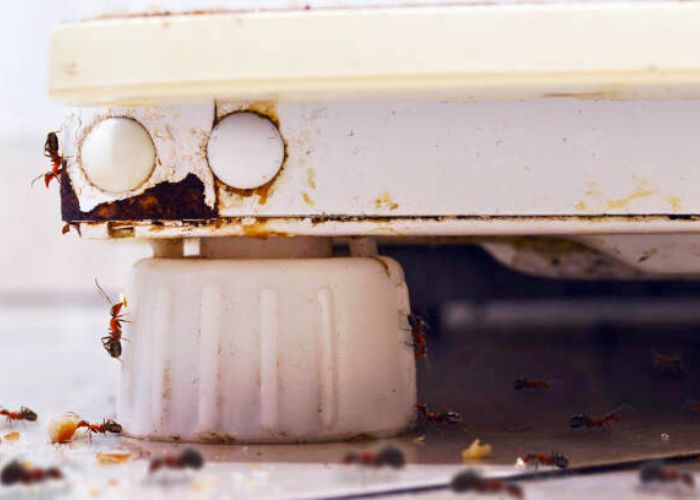As an Amazon Associate, I earn from qualifying purchases
Ant infestation in dishwashers is a common nuisance that many homeowners encounter. These tiny pests are drawn to the warmth and moisture of the dishwasher, making it an ideal nesting ground.
It’s crucial to address the issue of ants infesting dishwashers promptly. Not only can ants compromise the cleanliness of your dishes, but they can also pose a threat to your kitchen’s hygiene. Moreover, their presence can affect the functionality of the dishwasher, leading to potential damage and malfunction.
In this guide, we’ll explore effective solutions to eliminate ants from dishwashers. From preventive measures to targeted elimination techniques, we promise to equip you with the knowledge and tools needed to tackle this pesky problem head-on, restoring cleanliness and functionality to your kitchen appliance.
Understanding the Ant Problem in Dishwashers

Ants are naturally attracted to dishwashers due to several factors. The warmth generated during washing cycles, coupled with the presence of food residue and moisture, creates an inviting environment for ants. Additionally, dishwashers provide shelter and protection from predators, making them an ideal nesting spot for ant colonies.
Common entry points for ants into dishwashers include gaps or cracks around the appliance, as well as openings in the plumbing or electrical connections. Ants can also gain access through gaps in the door seals or through vents and drains connected to the dishwasher. Identifying and sealing these entry points is crucial to preventing further infestation.
Having ants in dishwashers poses various risks, both in terms of hygiene and functionality. Ants can contaminate dishes and utensils with bacteria and pathogens, jeopardizing food safety and potentially leading to health issues. Furthermore, ants may damage dishwasher components by building nests or chewing through wiring, resulting in costly repairs or even appliance replacement. Addressing the ant problem promptly is essential to mitigate these risks and ensure a safe and functional kitchen environment.
Prevention Measures
Keeping the Kitchen Clean and Crumb-Free
- Maintaining cleanliness in the kitchen is crucial to deter ants from infesting dishwashers. Regularly wiping down countertops, sweeping floors, and cleaning up crumbs will remove food sources that attract ants.
- Proper food storage and disposal are essential for minimizing ant attraction. Store food in airtight containers to prevent access for ants, and promptly dispose of food scraps in sealed trash bins. Avoid leaving dirty dishes in the sink, as this can also attract ants to the kitchen area.
Sealing Entry Points
- Inspect and seal gaps or cracks around the dishwasher and kitchen area to prevent ants from gaining entry. Pay close attention to areas where pipes or electrical wiring enter the walls, as these can serve as entry points for ants.
- Use caulking or sealants to seal any gaps or cracks found around the dishwasher and adjacent surfaces. Ensure a tight seal to prevent ants from finding their way into the dishwasher and nesting inside.
Natural Repellents
- Natural ant repellents such as vinegar, lemon, or essential oils can be effective in deterring ants from the dishwasher area. These substances contain strong scents that ants find unpleasant, discouraging them from entering.
- To use these repellents effectively, mix vinegar or lemon juice with water and spray the solution around the dishwasher and kitchen cabinets. Alternatively, place cotton balls soaked in essential oils, such as peppermint or lavender, near entry points to deter ants. Reapply these repellents regularly for continued effectiveness in keeping ants at bay.
Elimination Techniques
Safe Cleaning Methods
- To effectively eliminate ant trails and pheromones from the dishwasher, begin by removing any visible ants and food debris from the interior of the appliance. Then, mix a solution of warm water and mild dish soap and wipe down all surfaces, including the racks and seals. Pay particular attention to crevices and corners where ants may hide or leave pheromone trails. Rinse thoroughly with clean water.
- When selecting cleaning products for the dishwasher, opt for those specifically formulated for dishwashers and labeled as safe for the environment. Avoid using harsh chemicals or bleach-based cleaners, as these can be harmful to both the dishwasher and the environment. Eco-friendly options such as baking soda or vinegar can be effective and safe alternatives for cleaning and deodorizing dishwashers.
Non-Toxic Ant Baits
- Ant bait traps are a non-toxic method for eliminating ant colonies in and around the dishwasher. These traps contain bait that attracts ants, which they then carry back to the colony, effectively targeting the source of the infestation. Choose ant baits labeled as non-toxic and safe for indoor use to ensure the safety of household members and pets.
- Place ant bait traps strategically in areas where ant activity is observed, such as near the dishwasher, along ant trails, or near entry points. Avoid placing traps directly inside the dishwasher to prevent interference with its function. Check and replace bait traps regularly until ant activity subsides, typically within a few days to a week.
Professional Pest Control
- Consider seeking assistance from pest control professionals if ant infestations in or around the dishwasher persist despite DIY efforts. Professional pest control technicians have the expertise and tools necessary to identify and address underlying causes of ant infestations effectively.
- The benefits of professional intervention for severe or persistent ant infestations include customized treatment plans tailored to the specific type of ants and extent of the infestation. Pest control professionals can also provide ongoing monitoring and maintenance to prevent future infestations and ensure long-term relief from ants in the dishwasher.
Maintenance Tips to Prevent Future Infestations

Regular Inspection and Cleaning Routine
- Ongoing maintenance is crucial to prevent recurrence of ant infestations in the dishwasher. Regularly inspecting and cleaning the appliance and surrounding areas will help identify and address potential entry points for ants, as well as remove any food sources that may attract them.
- It’s recommended to inspect and clean the dishwasher and surrounding areas at least once a month. However, in areas with high ant activity or during peak ant seasons, more frequent inspections and cleanings may be necessary to maintain an ant-free environment.
Implementing Long-Term Preventive Measures
- To prevent future ant infestations, it’s essential to incorporate prevention strategies into daily routines. This includes maintaining cleanliness in the kitchen, sealing entry points, and using natural repellents to deter ants from entering the dishwasher and other areas of the home.
- In addition to the previously mentioned prevention measures, consider implementing the following tips to maintain an ant-free kitchen environment:
- Store food items in sealed containers to prevent access for ants.
- Keep kitchen surfaces clean and free of spills, crumbs, and grease.
- Trim trees and shrubs away from the exterior of the home to prevent ants from accessing the building.
- Repair any leaks or moisture issues in plumbing fixtures to eliminate water sources that attract ants.
- Regularly inspect and maintain outdoor garbage bins to prevent ants from foraging for food scraps.
- Monitor and address any signs of ant activity promptly to prevent infestations from becoming established.
By incorporating these long-term preventive measures into your routine, you can effectively maintain an ant-free kitchen environment and minimize the risk of future infestations in the dishwasher and throughout your home.
Conclusion
In conclusion, addressing ant infestations in dishwashers requires a multifaceted approach that encompasses understanding, prevention, and elimination techniques. By implementing the strategies outlined in this guide, you can effectively combat ants in your dishwasher and maintain a clean, functional kitchen environment.
We began by understanding why ants are attracted to dishwashers and identifying common entry points for these pests. Recognizing the potential risks associated with having ants in dishwashers underscores the importance of prompt action.
Prevention measures such as keeping the kitchen clean and crumb-free, sealing entry points, and utilizing natural repellents serve as the first line of defense against ant infestations. These proactive steps not only deter ants from entering the dishwasher but also contribute to overall kitchen hygiene.
In the event of an infestation, safe cleaning methods, non-toxic ant baits, and professional pest control offer effective solutions for eliminating ants from dishwashers. These methods target both visible ants and hidden colonies, ensuring thorough eradication of the infestation.
To prevent future infestations, regular inspection and cleaning routines are essential. By incorporating long-term preventive measures into daily routines, such as proper food storage, cleanliness maintenance, and outdoor area management, you can minimize the risk of ant recurrence in the dishwasher and throughout your home.
In essence, by following the guidelines provided in this guide, you can not only rid your dishwasher of ants but also maintain a hygienic and pest-free kitchen environment for years to come. So, roll up your sleeves, implement these strategies, and enjoy the peace of mind that comes with a clean and functional dishwasher.
FAQ
- Why are ants attracted to dishwashers?
- Ants are attracted to dishwashers due to the warmth, moisture, and food residue present inside the appliance, making it an ideal environment for nesting and foraging.
- How can I prevent ants from infesting my dishwasher?
- Preventing ant infestations in dishwashers involves maintaining cleanliness in the kitchen, sealing entry points around the dishwasher, and using natural repellents such as vinegar or essential oils to deter ants.
- What should I do if I find ants in my dishwasher?
- If ants are found in the dishwasher, it’s important to promptly clean the appliance using safe cleaning methods to remove ant trails and pheromones. Additionally, consider using non-toxic ant baits or seeking professional pest control assistance for effective elimination.
- How often should I inspect and clean my dishwasher to prevent ant infestations?
- It’s recommended to inspect and clean the dishwasher and surrounding areas at least once a month to prevent ant infestations. However, in areas with high ant activity or during peak ant seasons, more frequent inspections and cleanings may be necessary.
- What long-term preventive measures can I take to maintain an ant-free kitchen environment?
- Long-term preventive measures to maintain an ant-free kitchen environment include storing food in sealed containers, keeping kitchen surfaces clean and crumb-free, trimming trees and shrubs away from the home, and addressing any moisture issues or leaks that may attract ants.
As an Amazon Associate, I earn from qualifying purchases
Leave a Reply